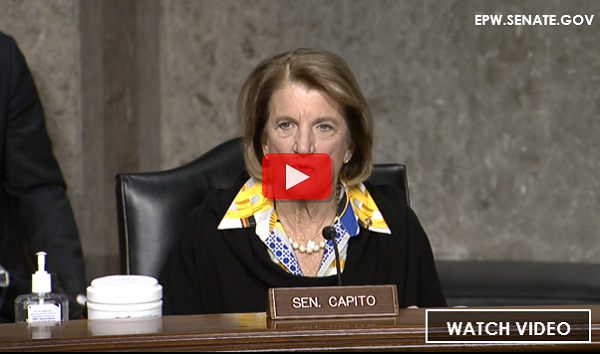
Click here or the image above to watch Ranking Member Capito’s opening remarks.
WASHINGTON, D.C. – Today, the
U.S. Senate Environment and Public Works (EPW) Committee held a hearing entitled “Examining
the Challenges Facing Drinking Water and Waste Water Infrastructure Projects.”
Below is the opening statement of Ranking
Member Shelley Moore Capito (R-W.Va.), as prepared for delivery:
“Thank you,
Chairman Carper, for you leadership and for putting this hearing together.
“I’d also like to
thank our witnesses and I very much look forward to discussing this important
topic with them.
“This committee
values your perspectives on the challenges facing this nation’s water
infrastructure, as well as your thoughts on effective solutions to address these
challenges.
“I appreciate our
regular conversations that I have with the chairman on this important and
bipartisan issue.
“Every day,
Americans rely on the infrastructure that supports our drinking water systems
and our wastewater systems.
“These are the
systems that this nation prides itself on providing access to clean and safe
water at the turn of a handle.
“Unfortunately,
this nation is facing critical challenges in the resilience of these systems,
with many of our rural communities being disproportionately affected by the
wide array of water infrastructure challenges.
“Small, rural
communities are particularly strained and need support to ensure protection and
availability of this vital resource.
“Many systems in
my state of West Virginia are very old—as I am sure is the same in other
states—and some of our systems do not even know where their pipes are, because
the infrastructure predates mapping records.
“Additionally,
reports have shown that only one quarter of the water West Virginia water
systems pay to have treated and pumped ever even reaches a faucet.
“So, water is a
valuable resource. And think about all that we are losing.
“And, of course,
some rural communities lack municipal drinking water service and sanitary waste
water infrastructure entirely.
“These challenges
are not unique to my state.
“They exist
throughout the country—in rural, urban, and tribal communities alike—and the
time for action to address these challenges is right now.
“I am committed
to addressing the challenges facing this nation’s water infrastructure
expeditiously, in a bipartisan way, and with an approach that prioritizes the
need.
“Chairman Carper
has set an aggressive timeline to address these needs legislatively. I
appreciate that. I have been pleased to negotiate with him to address water
infrastructure priorities, and I think we are very close to a bipartisan
agreement.
“Last year,
several drinking water and waste water provisions approved unanimously by this
committee in America’s Drinking Water Infrastructure Act and the Drinking Water Infrastructure Act failed to reach the finish line before the end of the Congress.
“These carefully
negotiated, bipartisan provisions are the perfect jumping off point to address
these challenges this Congress has in a timely and bipartisan fashion, and
clearing the way for new concepts in future legislation.
“It is vital that
we continue to work across the aisle to provide solutions that ensure
communities across the country are able to meet their water demands.
“This
responsibility includes a recognition that continued funding at the federal
level is necessary to address the various hindrances preventing resilient
infrastructure among our water systems.
“But, we also
need to acknowledge that continued or increased funding is only a solution
insofar as the funding targets the actual infrastructure where needs are most
apparent, and those needs can take many forms.
They include
priorities I have worked on, such as ensuring that systems have pipes that do
not leak and ensuring that there is a sustainable water workforce in place to
maintain and operate continued and new infrastructure investments.
“I think we need
to also start really considering the serious risks posed by our cyber security
threats.
“Different public
water operators face different issues, and we have a duty to ensure that these
systems are equipped with the right tools to address these various needs.
“When all you
have is a hammer, everything looks like a nail.
“That poses a
challenge when you need to drive a screw.
“Likewise,
pretending that throwing more taxpayer dollars at infrastructure needs will fix
the problems alone – without knowing what the actual needs are, where they are,
and how they will be most effectively addressed – will only get us so far.
“That is why this
committee must ensure that we provide the right tools in the drinking water and
wastewater infrastructure toolbox, and I think we are well on our way building
on last Congress’s good work.
“I am committed
to working on these issues that are so important to me, the citizens of the
state of West Virginia, and my fellow committee members.
“I know these
issues are also important to my friends on the other side of the aisle, and I have
no doubt we will continue to work hard together to address these critical
challenges.
“There are many
priorities where we share common ground, and this is certainly one of them.
“I look forward
to our continued partnership in this arena and to rolling our sleeves up on
behalf those in this nation that rely on us to ensure the safety and
availability of drinking water and wastewater services.
“Thank you Mr. Chairman.
I yield back my time.”
# # #